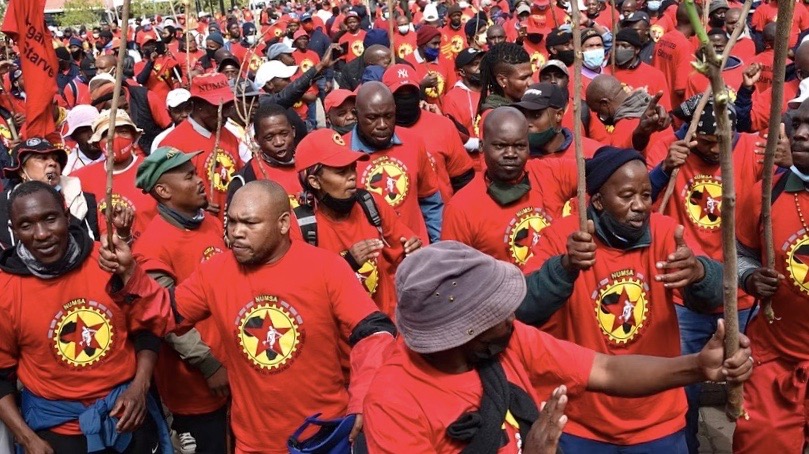As May Day marks the commemoration of historic labor struggles across the world, it also serves as a day for trade unions and organizations to mobilize to address the most pressing socio-economic problems confronting the working class.
For the National Union of Metalworkers of South Africa (NUMSA), this International Workers’ Day is being marked “against the backdrop of increasing poverty, inequality, and unemployment of the masses” in South Africa.
While the country has officially marked 29 years of freedom under the leadership of the African National Congress (ANC), NUMSA has condemned the government for “entrenching the power of the capitalist elite, instead of dismantling the colonial and apartheid structure of the economy.”
In a statement released on May 1, the union outlined two key challenges facing the country— a) the “deep global structural crisis of capitalism” which began in 2008, and b) the impact of neoliberal policies which oversee the imposition of “structural adjustment programs with the Reserve Banks, and the South African Reserve Bank dictating austerity measures.”
NUMSA also rejected the privatization of State Owned Entities (SOEs) at the behest of banks and international financial institutions, particularly the destruction of state energy utility company Eskom even as the country continues to face a debilitating energy crisis.
While Eskom’s Primary Energy Costs have grown significantly, from R83 billion (US$ 4.5 billion) in 2016-2017 to R132 billion (US$7.2 billion) 2021-2022, at least partly due to energy procurement from private producers, the state has been “taking away increases and benefits from workers at Eskom, whose wages and benefits have cost Eskom not more than 33 billion (US$1.7 billion)” within the same time period.
NUMSA has been organizing workers at Eskom to fight back against the rollback of their rights and has joined forces with other trade unions and political and civil society groups to demand state action to address the energy crisis and its impact on South Africa’s public sector and economy.
In its statement on Monday, the union also stressed the need for an expansionary budget with a stimulus package focusing on investing in infrastructure to stimulate economic growth. Crucially, NUMSA also called for the nationalization of the South African Reserve Bank (SARB).
“White monopoly capital and the unregulated, untransformed banking are benefiting from government guarantees that are given to them without any procurement process. They continue to drive high interest rates with the Reserve Bank that has for decades pursued high interest rates as an economic weapon, which is undermining manufacturing and industrialization,” the union’s statement read.
SARB announced a 50-basis point interest rate hike at the end of March—the ninth consecutive increase since November 2021—making the cost of borrowing the highest in over a decade, at a time when it should “be releasing liquidity to the economy so that the state can drive manufacturing and industrialization,” NUMSA said.
The union emphasized the need for the state to move away from austerity measures and to intervene in the economy.
While NUMSA has made key advances for workers in the last year—both in the workplace and in the courts—it stressed that “the gains we have made as workers are not enough to transform our society permanently, and make-up for the suffering caused by apartheid.”
Expressing solidarity with the struggles of the shack dwellers’ movement Abahlali baseMjondolo, NUMSA added, “If we want genuine freedom for the masses, we have to drive an agenda for the benefit of the working class. That includes amongst others, the nationalization of land and minerals for the benefit of the majority.”
“The working class will have to unite, and fight once more, for the work of the liberation movement to be completed.”





